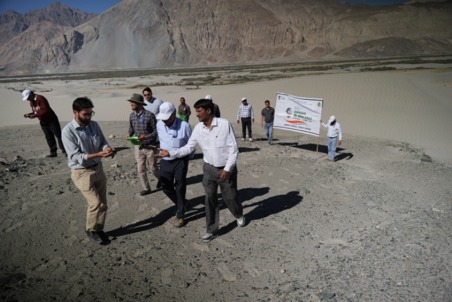As part of the Government of India’s Swachh Bharat Abhiyan initiative, the Geological Survey of India (GSI) conducted a successful Swachhata / cleanliness drive at the Geo-heritage Site “Land of Cold Desert, Shyok-Nubra valley” on 01-10-2024. This initiative was part of the “Swachhata Hi Seva” campaign, which ran from 17th September to 1st October, 2024, aligning with the theme “Swabhav Swachhata – Sanskaar Swachhata” that emphasizes cleanliness as an inherent behavior. The Swachhata Hi Seva 2024 campaign is a nationwide initiative that aims to promote cleanliness and a healthier India through a collaborative approach and focusing on three key pillars: Swachhata Ki Bhagidaari, Sampoorna Swachhata including Swachhata Lakshit Ekayi and Safai Mitra Suraksha Shivirs. The campaign is part of extensive cleanliness drives by GSI accompanied by plantation activities, and outreach programs for maintaining the environmental aesthetics, sustainable geo-tourism development and geo-heritage conservation.

The Swachhata Campaign witnessed a collaborative effort for the cleanliness drive, bringing together the personnel from Geological Survey of India (GSI), Department of Geology and Mining (DGM), UT, Ladakh, Local administration officials, representatives from Indian Army, Diskit Gonpa, Diskit degree College, inter-college, students, other participating organizations and local people. Secretary, Ministry of Mines, Shri V.L. Kantha Rao, graced the occasion and participated in the Swachhata Campaign as the Chief Guest. Shri Rajinder Kumar, Additional Director General and Head of Department (HOD) of the Geological Survey of India, Northern Region, and Shri. P.S. Misra, Dy. Director General SU: UT: J&K, and UT: Ladakh also joined the Swachhata Campaign, participating alongside the Secretary, Ministry of Mines. The campaign witnessed the successful cleanliness drive at Nubra Valley’s breathtaking Land of Cold Desert, Shyok-Nubra valley Geo-Tourist Site. The Secretary, Ministry of Mines emphasized on the importance of Swachhata Hi Seva and asked the participants and students to adopt the SHS mission.

The breathtaking Ladakh region is renowned for its remote mountain beauty, rich culture, and stunning geological marvels. The Geoheritage Site “Land of Cold Desert, Shyok-Nubra Valley” of the UT: Ladakh has been recognized by the Geological Survey of India, Ministry of Mines, Government of India, for its exceptional geological significance. Such geoheritage sites are treasure troves of geo-relics, phenomena, and geological structures that hold national and international interest.
Located at the confluence of the Shyok and Nubra rivers near Diskit, the Shyok-Nubra valley boasts unique geological features. The presence of sand dunes, reminiscent of Rajasthan’s deserts, attracts tourists who can experience the thrill of double-hump camel rides. At an altitude of 3048 m above mean sea level, these dunes are the largest in the Trans-Himalayan region. These sand dunes hold particular interest for geologists, indicating climatic variations in this high-altitude terrain. Situated along the riverbanks, they offer valuable insights into Quaternary geological studies. The Shyok-Nubra valley also exposes an ophiolite rock bearing suture zone, immensely important for understanding the Himalayan evolution and journey of Indian tectonic plate.

Comments are closed.